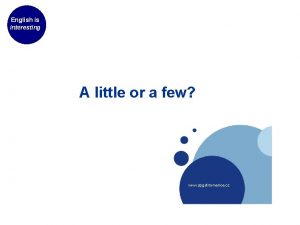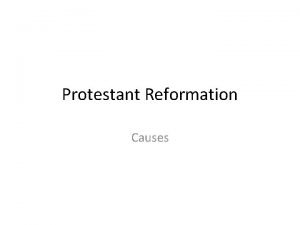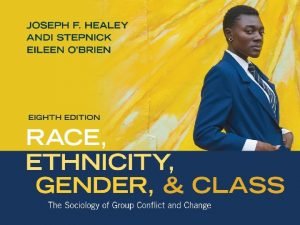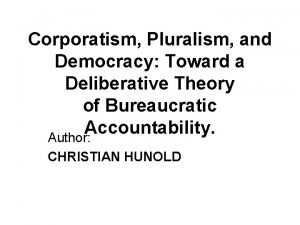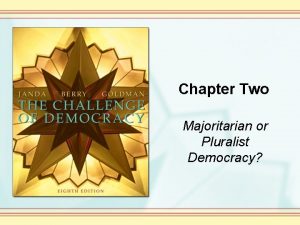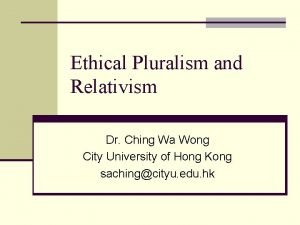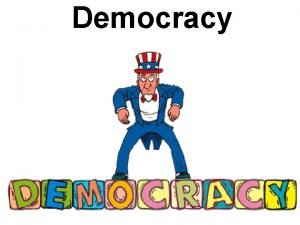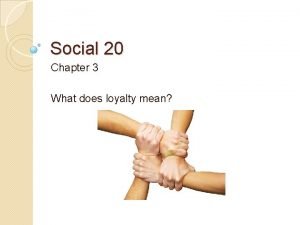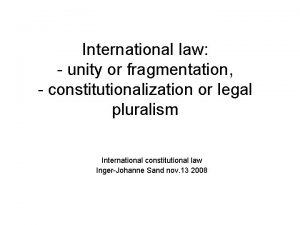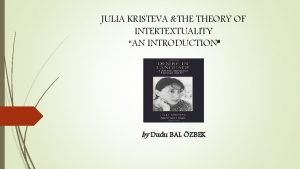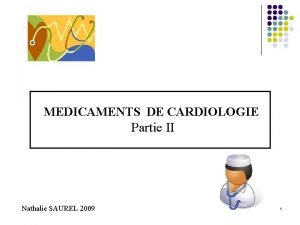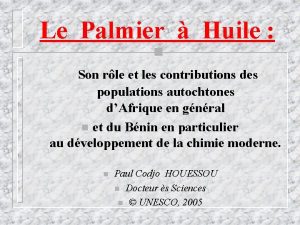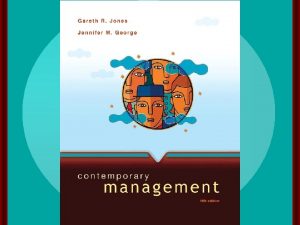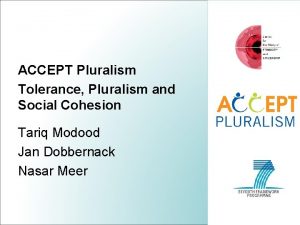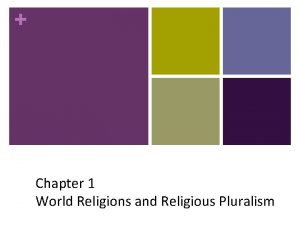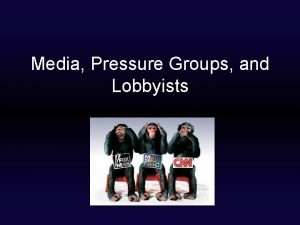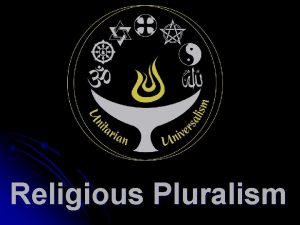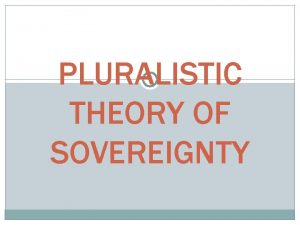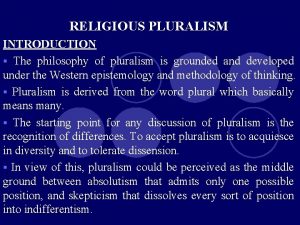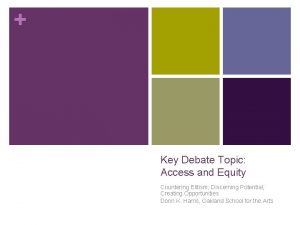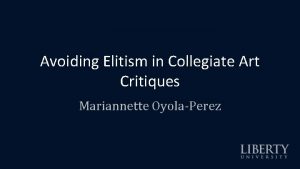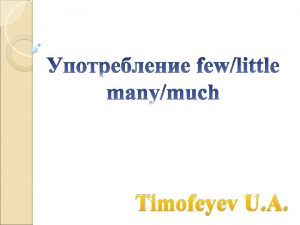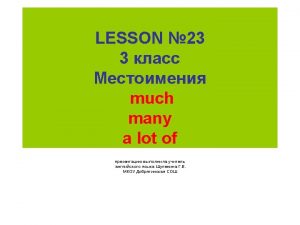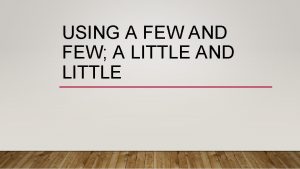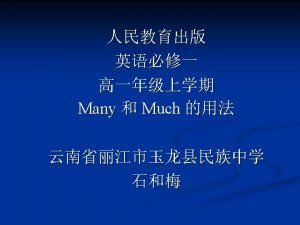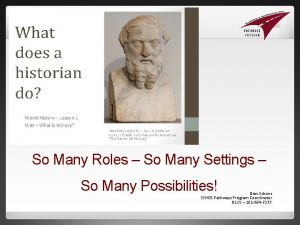PLURALISM ELITISM The many and the few Derives


















- Slides: 18

PLURALISM & ELITISM (The many and the few)

• Derives from the word Plural • “Containing, involving or composed of more than one”. • Central tenet of Liberalism • Competition & disagreement healthy (J. S. Mill) • Competing ideas -The truth can only be found through discussion when people are open to criticism (Mill)

Countervailing ideas • https: //www. youtube. com/watch? v=a 0 Bpfwa zh. UA

• Central to democratic thought and practice. • Countervailing groups (eg League Against Cruel Sports vs the Countryside Alliance) • Opposes Marxists and elitists in suggesting in liberal societies there is a dispersal of power

Pluralism & Power • Pluralism espouses the distribution, dispersal and separation of power and influence • It opposes absolutism and monism • It supports multiculturalism and can be found in Socialist, anarchist and Conservative thinking

Pluralism opposes elitism • Elitism: social hierarchy natural and desirable • Those ‘born to rule’ • Traditional conservatism: we seek the security of ‘knowing our place’; provides stability • Benevolent elitism: Disraeli's ‘noblesse oblige’; One Nation Conservatism

Elitism • • • Those who went to public school: 71% Senior Judges 31% MPs 50% the Cabinet 50% Lords 43% newspaper columnists 45% public body chairs

• • Elitism Oxbridge: 75% Senior Judges 50% Cabinet 47% newspaper columnists 44% chairs of public bodies 38% Lords 24% MPs In Attlee’s government (1945) there were 28 from public schools, including 7 from Eton

A pluralist state functions as: • A minimal and neutral role for the state • Locke’s arbiter state • There is a choice of competing political parties allowing government by consent • Electors express independent views • The state should promote debate and safeguard individual freedom

• In Europe pluralism began as a response to absolutism • In USA it began as a practical response to limit state power • Concerned with how society should be organised in order to achieve a just society • Diversity is a social good • Prevents the dominance of one particular idea • Power should be dispersed

The Main Principles of English Pluralism • Liberty the most important political value • Liberty best preserved by power being dispersed • Groups should be regarded as ‘persons’ (representative) • Ideas of state sovereignty should be rejected

• However, early English pluralists opposed the individualism of liberalism • They saw groups as the main elements of society (family, village, community) • Individuals have no independent existence (other than through groups) • Group identity and representation an important element in the political structure (eg constituencies; rotten boroughs) • Groups are therefore the building blocks of politics and the state

• English pluralists therefore concerned with: 1) State sovereignty (constrained by groups) 2) The role of groups therefore important in democracy

American Pluralism • Particularly opposed to a powerful imperial state (Britain) • Necessary to ensure powers of state limited to avoid groups being crushed • Emphasised separation of powers • Federalism • Lobbyists/ ‘K Street’ corridor

Britain after WW 2 • Pluralism weakened by a growing, complex state (in the USA a welfare state failed to develop) • Growing symbiotic relationship between civil servants and ministers • Power monopolised within a closed and elitist state • Thatcher suspicious of groups (eg unions) & emphasised a direct relationship between the sovereign government and the individual

BUT • Assumptions of pluralism challenged by: 1) Civil rights movement (groups are not truly equal) 2) Anti-Vietnam War movement (government elites control our lives)

Modern pluralism • State “hollowed out” in late 20 th Century • Pluralists see “voluntaristic solutions to deep seated structural problems” (Smith 2006) • The Big Society? • Postmodernists, like pluralists, reject monism (especially the Marxist belief in a single truth and explanation – everything linked to class)

Multiculturalism & Pluralism • Multiculturalists see rights as group-based rather than individual (eg the rights of religious groups) • Generally recognised as a good thing But • Some Muslim women might want their rights protected as individuals rather than as Muslims So • Dilemma: is there a tension between group rights and individual rights?
 Little and few
Little and few A few vai few
A few vai few Few, a few, little, a little exercise
Few, a few, little, a little exercise Complete the sentences with these words.
Complete the sentences with these words. Pluralism and absenteeism
Pluralism and absenteeism Pluralism and assimilation
Pluralism and assimilation Pluralism vs corporatism
Pluralism vs corporatism Majoritarianism vs pluralism
Majoritarianism vs pluralism Cultural ethical relativism
Cultural ethical relativism Examples of democracy
Examples of democracy What is cultural pluralism
What is cultural pluralism Pluralism
Pluralism Legal pluralism
Legal pluralism Les dérives du pétrole sont des matériaux synthétiques
Les dérives du pétrole sont des matériaux synthétiques Sphingoglycolipides
Sphingoglycolipides Intertextuality by julia kristeva
Intertextuality by julia kristeva Dérivés nitrés
Dérivés nitrés Produits dérivés du palmier à huile
Produits dérivés du palmier à huile In a bureaucracy a manager's formal authority derives from
In a bureaucracy a manager's formal authority derives from
